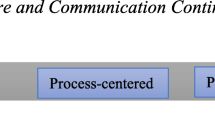Abstract
With an increasing population of persons with limited English proficiency (LEP), psychologists are likely to need to conduct assessments through a foreign language interpreter at times. The goal of the interpreter-mediated patient encounter should be to approximate a language-congruent clinical encounter. Issues such as the spatial configuration of all participants during the session, guidelines for the interpreter’s verbalizations, and some modification of the psychologist’s interview style will maintain patient rapport while obtaining necessary patient information.
Similar content being viewed by others
References
American Psychological Association (2017). Ethical principles of psychologists and code of conduct. Washington DC: American Psychological Association, (https://www.apa.org/ethics/code/index.aspx).
Bogic, M., Njoku, A., & Priebe, S. (2015). Long-term mental health of war-refugees: a systematic literature review. BMC international heaith and human rights, 75(1), 3–41
Flores, G. (2005). The impact of medical interpreter services on the quality of health care: a systematic review. Medicai Care Research and Review, 62(3), 255–299.
Flores, G., Abreu, M., Barone, C. P., Bachur, R., & Lin, H. (2012). Errors of medical interpretation and their potential clinical consequences: a comparison of professional versus ad hoc versus no interpreters. Annals of Emergency Medicine, 60(5), 545–553.
Juckett, G., & Unger, K. (2014). Appropriate use of medical interpreters. American Family Physician, 90, 476–489
Ma-Kellams, C. (2014). Cross cultural differences in somatic awareness and interoceptive accuracy: A review of the literature and directions for future research. Frontiers in Psychology, 5, 1379. https://doi.org/10.3389/fpsyg.2014.01379.
Raval, H., & Tribe, R. (2014). Working with interpreters in mental health. London: Routledge.
Schulz, P. M., Resick, P. A., Huber, L. C, & Griffin, M. G. (2006). The effectiveness of cognitive processing therapy for PTSD with refugees in a community setting. Cognitive and Behavioral Practice, 73(4), 322–331.
Searight, H. R., & Gafford, J. (2005a). Cultural diversity at the end of life: issues and guidelines for family physicians. American Family Physician, 77(3), 515–22.
Searight, H. R., & Gafford, J. (2006). Behavioral science education and the international medical graduate. Academic Medicine, 81(2), 164–170.
Searight, H. R., & Searight, B. K. (2009). Working with foreign language interpreters: Recommendations for psychological practice. Professional psychology: Research and practice, 40(5), 444–451
The Joint Commission (2015). Overcoming the challenges of providing care to LEP patients. https://www.jointcommission.org/ssues/article.aspx?Article=07L7HYJFF9ixfyUPFpD2. Accessed on June 14, 2017
U.S. Census Bureau (2015). Census bureau reports at least 350 languages spoken in U.S. homes. http://www.census.gov/newsroom/press-releases/2015/cb-15-185.html. Accessed June 8, 2017
Zong, J., & Batalova, J. (2015). The limited English proficient population in the United States. Migration Policy Institute. Available at: http://www.Migrationpolicy.org/article/limitedenglish-proficient-population-united-states/. Accessed June 8, 2017
Author information
Authors and Affiliations
Additional information
Prior to his current position, he was Clinical Associate Professor of Community and Family Medicine at Saint Louis University School of Medicine as well as Director of Behavioral Medicine at an affiliated Family Medicine Residency in St. Louis, Missouri. His professional interests include psychological practice in the primary healthcare setting, ethical dilemmas in medicine and public health, and cross-cultural issues in end-oflife care.
Rights and permissions
About this article
Cite this article
Searight, H.R. Clinical and Ethical Issues in Working with a Foreign Language Interpreter. J Health Serv Psychol 43, 79–82 (2017). https://doi.org/10.1007/BF03544654
Published:
Issue Date:
DOI: https://doi.org/10.1007/BF03544654




